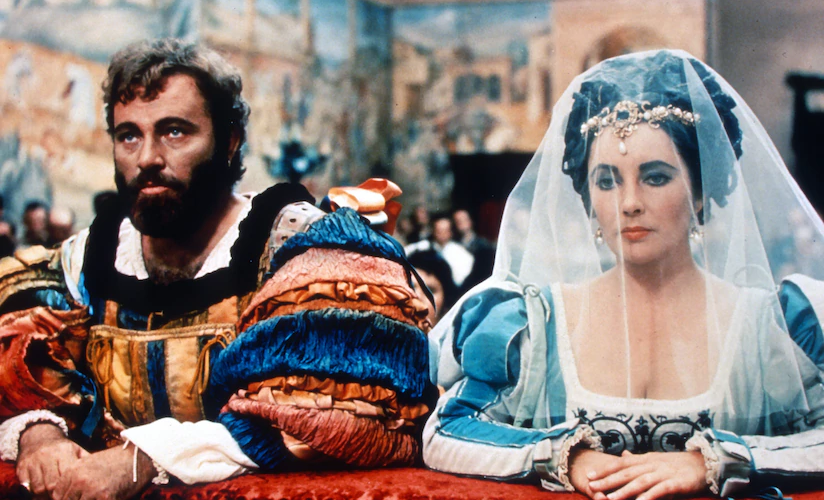To say that The Taming of the Shrew is a less popular work of Shakespeare would be an understatement. The play is commonly passed over for better-known tragedies like Hamlet and Othello, or even other comedies like Twelfth Night and A Midsummer Night’s Dream. If you read it in high school or have seen it performed, it was probably with many a disclaimer about its misogyny.
And for good reason. One need only look at the title. The titular shrew—a derogatory term for a woman perceived to be ill-tempered, argumentative, or outspoken—is Katherina Minola, the eldest daughter of a Paduan Lord. Katherina is notoriously strong-willed and uninterested in playing the part of a demure, passive woman. Her outlook alienates her from the men in Padua, who decry her father, Baptista, for raising a headstrong shrew. If they had their way, they’d have nothing to do with her.
Yet they must, for Baptista decrees that if Katherina is not married, none may have the hand of his younger daughter Bianca, the quiet, submissive picture of the cult of domesticity. She is courted by Hortensio and Gremio, as well as Lucentio, a university student.
Enter Petruchio, a friend of Hortensio’s from Verona who has come to Padua to seek a wife. “I come to wive it wealthily in Padua,” he says. “If wealthily, then happily in Padua.” Bianca’s suitors enlist Petruchio to “tame” Katherina, leaving the others to vie for Bianca’s hand.
While the title of the play is sexist enough, it is Petruchio’s “taming” behavior that is truly egregious. For Petruchio, taming entails psychological manipulation, physical torture, and emotional abuse. In their first conversation, Petruchio decides he’ll undermine every word Katherina speaks.
“Say she be mute and will not speak a word;
Then I’ll commend her volubility,
And say she uttereth piercing eloquence:
If she do bid me pack, I’ll give her thanks,
As though she bid me stay by her a week:
If she deny to wed, I’ll crave the day
When I shall ask the banns and when be married.”
Later, Petruchio resorts to full-on gaslighting, testing Katherina’s submissiveness by bending her perception of the world to his will.
PETRUCHIO: Good Lord, how bright and goodly shines the moon!
KATHERINA: The moon! the sun: it is not moonlight now.
PETRUCHIO: I say it is the moon that shines so bright.
KATHERINA: I know it is the sun that shines so bright.
PETRUCHIO: Now, by my mother’s son, and that’s myself,
It shall be moon, or star, or what I list,
Or ere I journey to your father’s house.
Go on, and fetch our horses back again.
Evermore cross’d and cross’d; nothing but cross’d!
HORTENSIO: Say as he says, or we shall never go.
KATHERINA: Forward, I pray, since we have come so far,
And be it moon, or sun, or what you please:
An if you please to call it a rush-candle,
Henceforth I vow it shall be so for me.
PETRUCHIO: I say it is the moon.
KATHERINA: I know it is the moon.
PETRUCHIO: Nay, then you lie: it is the blessed sun.
Petruchio is not satisfied until Katherina gives in completely, assuring him that “what you will have it named, even that it is; and so it shall be so for Katherina.”
The extent of Petruchio’s depravity can be seen later, when he breaks Katherina’s spirit through physical torture. Petruchio flies into a rage at his chefs as a pretense for depriving her of food, and ruffles the bed sheets and curses loudly to keep her from sleeping.
To make her come and know her keeper’s call,
That is, to watch her, as we watch these kites
That bate and beat and will not be obedient.
She eat no meat to-day, nor none shall eat;
Last night she slept not, nor to-night she shall not
Petruchio’s repulsive “taming” is textbook spousal abuse. He proclaims his actions are done “in reverend care of her,” a common tactic employed by domestic abusers to portray their behavior as benefiting the victim.
Eventually, Petruchio wears Katherina down, getting her to bow to his will and accept him as her master. In the final scene, after Bianca marries Lucentio and Hortensio weds a wealthy widow, the three men wager on which of their wives will come first when called. Much to everyone’s surprise, Hortensio’s wife and Bianca say they cannot appear at the moment, while Katherina willingly arrives at Petruchio’s side. Katherina chides the other women for their lack of fealty and urges them to “place [their] hand below [their] husband’s feet,” for “Thy husband is thy lord, thy life, thy keeper, thy head, thy sovereign.” The speech completes Katherina’s about-face in just five acts.
So what’s the deal here? Why should we care about this play? We know it was misogynistic, but that was then and this is now, right?
The problem is that the play, for all its faults, is not simply a product of its time. At its core, it represents a patriarchal mindset that lingers today. Though women have made great strides towards equality, there is still much to be achieved, and cultural reactionaries threaten to roll back what gains have been made. An entire online ecosystem, the manosphere, has convinced a generation of young men that their culture has been undermined by feminism.
Among them is Jordan Peterson, a Canadian psychologist who has made a name for himself by railing against what he sees as the breakdown of the successful Western model and the patriarchal system that produced it. Peterson has shown disdain for modern feminism and questioned whether its aims are just. The #MeToo movement, in his words, reflects “a bigger problem in society, which is that the birth-control pill has enabled women to compete with men on a fairly equal footing. But we still don’t know what the rules are that should govern the behavior, the interaction between men and women in places like the workplace.” Peterson’s fears display a curious irony: he champions Western civilization, but bemoans the sexual liberation that makes it unique. Likewise, patriarchy doesn’t exist, but also isn’t necessarily a bad thing.
Peterson’s opposition to feminism has endeared him to young men, who Peterson was once bewildered to find constitute 91 percent of his YouTube audience. Peterson flaunts his psychological background to offer a vision for young men unmoored by political correctness and gender parity, which he derides as a “murderous equity doctrine.” His 2018 self-help book 12 Rules for Life explains his reactionary worldview: men need to get tough. “Men demand it, and women want it.” Violent men are bad, Peterson claims, but their violence is bolstered when men are not allowed to embrace their masculine impulses. Peterson’s outlook stems from his beliefs on the inherently gendered nature of order and chaos: “consciousness is symbolically masculine and has been since the beginning of time.” Alternatively, “chaos—the unknown—is symbolically associated with the feminine.”
In Peterson’s view, Petruchio is not a masculine oppressor worthy of scorn. Instead, he is someone we should emulate to bring back our lost culture. Peterson is Petruchio’s intellectual successor, and takes just as much issue with “shrews” (he calls them “harpies”).
Bianca’s suitor Lucentio would be the opposite. Lucentio woos Bianca by disguising himself as her tutor. One might infer that Lucentio would be the sort of man Peterson disapproves of; unwilling to embrace his masculine impulses to rein in Bianca, whose femininity forebodes the “Dragon of Chaos.” Peterson would see Bianca’s unwillingness to obey Lucentio’s request in the end as karma for this failing. Fail to put one’s foot down, and women run amok.
Peterson firmly believes in the female desire for domineering men, even suggesting that “feminists avoid criticizing Islam because they unconsciously long for masculine dominance.” Indeed, Peterson’s words often parallel the final speech of the temperamentally lobotomized Katherina. Quoth she to the other brides: “I am ashamed that women are so simple, To offer war where they should kneel for peace . . . Come, come, you froward and unable worms!” Quoth he: “It’s sane women who have to stand up to their crazy sisters and say ‘look, enough of that, enough man hating, enough pathology, enough bringing disgrace upon us as a gender.’”
Simply contextualizing The Taming of the Shrew as a product of another time will not deter today’s generations from its misguided teachings. For they are exactly its appeal to pro-patriarchy reactionaries, who find joy in what was once gone, yet may be again. Fans of Jordan Peterson would not see in Petruchio a man who should no longer exist; they’d see a reflection of their future, should they “toughen up.” Peterson’s worldview resonates with those who feel lost and adrift between changing gender norms and lingering cultural conservatism. Instead of adapting to the former, Peterson, in effect, preaches they should emulate Petruchio and adopt the latter.
This attitude has dangerous ramifications not just for the young men being pushed towards a perverse vision of self-actualization, but for the women who bear the consequences. This past year, with people trapped in their homes due to COVID lockdowns, has seen a spike in domestic violence against women, even as calls to hotlines plummeted (with women unable to safely contact help).
The United Kingdom faces a national reckoning on gender-based violence after the kidnapping and killing of Sarah Everard (for which a London police officer has been charged), and the subsequent police brutalization of female attendees of a candlelit vigil. The national outcry is a painful reminder of the unfilled aims of the 1977 “Reclaim the Night” protests, which demanded a change to the culture that made women feel unsafe at night. Our culture directly descends from that which played Petruchio’s torture of Katherina for a punchline.
Yet we should not abandon the play altogether, for the play is not the cause of this epidemic of angry young men. The lessons we draw from the play, and the message we choose to send when it is performed, can be drastically changed.
Some directors take advantage of the play’s often-cut-for-time framing device, wherein a drunken man wakes up and is told he is a king. Unbeknownst to him, he is the subject of a prank played by a wealthy lord, who orders his servants to deceive the drunkard. As part of their ploy, actors put on a show for him. The play-within-a-play setup could imply that what we are seeing is meant to be satirical. Further supporting this interpretation is the fact that, in its original production, the female characters were portrayed by young men. This suggests that there might be some irony in a man dressed as a woman extolling the virtues of patriarchy.
Other productions portray the relationship between Katherina and Petruchio more positively. These do not cast Katherina as a woman whose will is suppressed; they show Petruchio offering Katherina a companion in a society that scorns her. Their first conversation, though tense, reveals something other characters miss: Katherina, for all her bluster, is quite witty. The dialogue between the two characters goes back and forth like a tennis match, the two trading puns and double entendres with ease.
The play does provide some basis for the “two misfits” interpretation. Petruchio shows up to the wedding late, wearing ridiculous clothing, and offends the guests by acting as boisterous as possible. An attempt to quell any dissent from Katherina by outdoing her? Perhaps. But one could also make the case that Petruchio’s differences from the rest of society—after all, he is the only one willing to handle the misunderstood Katherina—makes him the perfect partner for her. Such is the approach of the contemporary adaptation most people know, Ten Things I Hate About You.
These interpretations may be a stretch. But reframing the play is more effective than discarding it—the failed approach of cultural conservatives to literature they despise.
People like Jordan Peterson do not pop up overnight. Nor will his odious ideology disappear with him. If we are to create a new world of gender equality absent rampant misogyny, we must look to our past not for guidance on how to recreate it, but to understand how to stamp it out.



